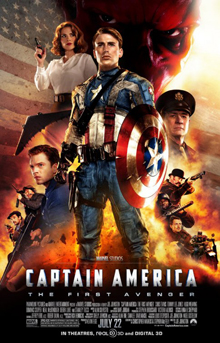The First Avenger follows Steve Rogers, a boy desperate to join the army and help fight for his country in the Second World War. He is soon transformed into a super soldier, becoming Captain America, supporting troops oversees before he himself is plunged into the midst of battle, attempting to stop Red Skull, Hitler's head of weaponry, from using a tesseract energy source for world domination. Yes, the plot is preposterous, but it really doesn't matter. Captain America was created to promote America, and that's exactly what the movie adaptation does. In fact, I don't think I've ever seen so many stars and stripes in one film.
 I believe Thor and Captain America work because of their uniqueness. They break the mould, if you will, of the generic super hero movie that we are all now accustomed to. Iron Man, Spider Man, even The Dark Knight to some degree, (although in no way am I criticising the latter) all take place in a city location. Frankly, it's beginning to get tiresome. The majority of Thor, however, takes place in the mythical world of Asgard, while Captain America takes place on the front line of World War II. It's a refreshing take on something that's been done thousands of times before. On that note, director Joe Johnston has done a terrific job of mirroring the streets of forties New York. This could, in all honesty, be your typical war drama.
I believe Thor and Captain America work because of their uniqueness. They break the mould, if you will, of the generic super hero movie that we are all now accustomed to. Iron Man, Spider Man, even The Dark Knight to some degree, (although in no way am I criticising the latter) all take place in a city location. Frankly, it's beginning to get tiresome. The majority of Thor, however, takes place in the mythical world of Asgard, while Captain America takes place on the front line of World War II. It's a refreshing take on something that's been done thousands of times before. On that note, director Joe Johnston has done a terrific job of mirroring the streets of forties New York. This could, in all honesty, be your typical war drama. Chris Evans, after his disappointing, if not disastrous turn as the Human Torch in Fantastic Four, is perfect for the role of Captain America. I suppose, in hindsight, it was Evans who encouraged my reluctance to see the film in the first place. After all, it would be so easy to turn Cap into the cheesy, gimmicky joker that Evans played in one of Marvel's worst film franchises. There's no need to fear. The action is fun, but there are moments of seriousness that allows Evans to actually act. The Human Torch, truthfully, was a very two dimensional character. Surprisingly, Captain America is one hero who doesn't mind killing people; this is war after all. (One particular scene with a propeller comes to mind. Nasty.) Hugo Weaving as Red Skull brings nothing particularly interesting to the role. He does, at times, embrace the awful cliches that seem to epitomise Hollywood's portrayal of evil. It's a shame, but the film's positives outweigh these minor criticisms. Even the film's supporting cast, Stanley Tucci as Abraham Erskine, for instance, is brilliant. Credit must also go to Hayley Atwell as love interest, Peggy Carter, a Brit who holds her own amongst the film's strong, American cast.
It'll be interesting to study Cap's character arch in The Avengers. After all, his transition into the present could surely be a premise for a whole other sequel. It's almost a shame that Evans has to sacrifice his screen time in order to make way for the others. Maybe Captain America 2 before The Avengers would have made more sense. I will, however, reserve complete judgement on this until I see The Avengers.
‘A weak man knows the value of strength and compassion,’ Tucci mutters to Evans during the course of the film. This is very much the theme of the movie. Captain America: The First Avenger won't win any major awards, but it will entertain the child inside of you, and, if you can stomach Alan Silvestri's overwhelming, patriotic soundtrack, you may leave the cinema feeling very satisfied indeed. Remember to stick around for a post-credits trailer for The Avengers.
"You know what?" I said to my friend, who attended the same screening. "I'm no comic book nerd, but that just got me very excited." Congratulations Marvel. You've set everything up for The Avengers very nicely. Very nicely indeed.
My Rating: * * * *






